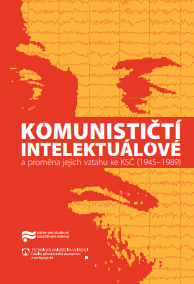Komunistický intelektuál - víťaz hodnotového sporu v „medzičase“ pred komunistickou diktatúrou
A communist intellectual - the winner of the argument of values in the “break” before the communist dictatorship
Author(s): Vlasta Jaksicsová
Subject(s): Political history, Social history, WW II and following years (1940 - 1949), Post-War period (1950 - 1989), History of Communism
Published by: Ústav pro studium totalitních režimů
Keywords: Czechoslovakia; communist party; 20th century; postwar period; intellectuals;
Summary/Abstract: The story of the European “communist intellectual” (Czech or Slovak intellectuals included) began in 1920s. It was him, who used the crisis of the modern society to spread the myth of just heaven in Lenin’s soviet Russia (after 1917) and in 1930s in Stalin’s Soviet Union. The disillusion caused by the failure of the European civilization and demise of the “old world” and its order in the first world war played a crucial role in establishment of the leftist oriented European avant-garde of the 1920s. Repeated (and intensified) feeling of disappointment from the failure of the civilization was brought by the second world war and invigorated the mind of the communist intellectual in his faith in the communism as the only possible and right social project. In the minds of the people became the end of the Second World War a psychological, economical and cultural turning point. The war disintegrated traditional system and created new ones in a time, when return of the past looked thanks to previous war experience inconceivable. In the Czech-Slovak and wider European context was the war followed by three years of rivalry between socialist and communist view on democracy and the liberal and conservative Christian democracy. Dispute over values (ideal, esthetical, ideological and concepts and visions) was a result of a deep and fundamental change of the reality of the post-war society, which was the cause of the inclusion of Slovakia as part of the renewed Czechoslovak republic in the Stalin’s sphere of interest. This (in foreign affair context and with the victory of democracy over fascist dictatorship) was comprehended as a leftist or socialist choice of values in the local cultural and social conditions that limited pluralism and got a label of “people democracy”. It is not very surprising, that the war of values between communist left with liberal or conservative right became a conceptual part of a wider cultural and artistic discourse in Slovak environment, where literature and journalism played an important role in the society. It is well known that communist intellectual triumphed in this important fight in the Eastern Europe under Stalin’s control. He was convinced that his only conceivable way of life is a communist way. “Soviet ally” and a big “Slavic brother” for European “liberating” project entered a favorable times for imposing socialist ideas in the heads of important political and cultural elites of post-war Czechoslovakia.
Book: Komunističtí intelektuálové a proměna jejich vztahu ke KSČ (1945-1989)
- Page Range: 32-53
- Page Count: 22
- Publication Year: 2013
- Language: Czech
- Content File-PDF

